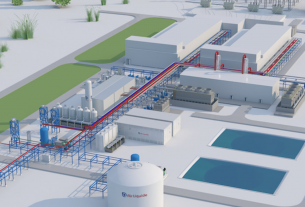Spain – The SHYNE (Spanish Hydrogen Network) project, comprised of 33 entities from various sectors and the largest renewable hydrogen consortium in Spain, was presented at Campus Repsol.
It brings together 22 companies and 11 associations, technology centers, and universities under the leadership of Repsol with the goal of promoting renewable hydrogen projects in all sectors of the Spanish economy and, as a result, stimulating rapid and effective decarbonization through this energy vector, which is regarded as a key to the energy transition.
SHYNE aspires to be a benchmark project in Europe, structuring new opportunities across the value chain through collaboration between companies pursuing a common goal: decarbonizing their activity and pooling efforts and investments to achieve it. In addition to Repsol, the project has six promoting partners. Alsa, Bosch, Celsa, Enagas, Scania, and Talgo are all market leaders in their respective fields.
The projects included in SHYNE will require a total investment of €3.23 billion. This investment will enable the implementation of various initiatives for the production, distribution, and use of renewable hydrogen in the industrial sector, transportation, and other applications, as well as the development of cutting-edge technologies and the acceleration of deployment plans for this gas. More than 13,000 jobs are expected to be created as a result of the overall project.
The projects involve 11 associations, technology centers, and universities as collaborators. The Spanish Hydrogen Association (AEH2), the National Center for Hydrogen and Fuel Cell Technology Experimentation (CNH2), the Spanish Society of Ceramics and Glass, the Spanish National Research Council (CSIC), the Automotive Technology Center of the Region of Galicia (CTAG), the Foundation for the Development of New Hydrogen Technologies in the Region of Aragon (FHa), the Energy Research Institute of Catalonia (IREC), TECNALIA, and Cidetec are among them.
The consortium is made up of 22 companies from various industries, including Iberia and Balearia, which are leaders in air and maritime transportation, respectively. Navantia, a public company, and PYMAR, a Spanish company that brings together small and medium-sized private shipyards. Sidenor, AMES Group, and Tubacex are examples of steel companies. Calvera is a company that creates gas storage and distribution systems. Companies that generate electricity, such as BBE. EPowerlabs is an example of an electric mobility engineering firm. Wartsila, the leading engineering company in marine solutions, and Primafro, a specialist in refrigerated transport. The technology firms Zigor, which develops power electronics systems, and Magrana, which specializes in innovative industrial solutions. Also, DYPAM, a University of Castile-La Mancha spin-off focused on the design and processing of advanced materials. Through the SHYNE consortium, the synergies between these entities will drive coordinated industrial developments throughout the hydrogen value chain.
A project in line with the goals of the government
Spain, in comparison to other countries, is in a privileged position to capitalize on the opportunities created by the new renewable hydrogen economy, owing to the abundance of solar and wind resources, as well as the industry’s own capacity to adapt to a new economy centered on the hydrogen value chain.
The SHYNE project aims to create an ecosystem that connects the large regional hydrogen initiatives that are already in place, such as the Basque Region Hydrogen Corridor (BH2C), the Catalan Hydrogen Valley, and the Murcia Hydrogen Valley. Furthermore, SHYNE will encourage the establishment of two new innovation hubs in the regions of Castile-La Mancha and Madrid. Their goal will be to advance competitive technologies in development, such as photoelectrocatalysis or solid oxide electrolysis (SOEC). These technologies will aid the country’s technological sovereignty in this new energy vector.
In addition, a knowledge management center will be established in Madrid to coordinate cross-cutting actions and position the participating technology centers and universities as European reference points. As a result, an efficient network will be established, capturing synergies between production poles, industrial centers, and other hydrogen consumers, ensuring the competitiveness of renewable gas and avoiding the transfer of additional costs to end users.
The SHYNE project is completely in line with the goals of both the European Union and the Spanish government. The latter has set a target of 4 GW of capacity by 2030 in the Hydrogen Roadmap, which was published in October 2020. For its part, the “Spain Can Plan” encourages the formation of such consortia, particularly those that are multisectoral and integrate the entire value chain, as well as those that promote public-private collaboration and collaboration with small and medium-sized businesses, as well as research centers, in order to boost the hydrogen economy.
SHYNE, in turn, is aligned with the Strategic Projects for the Recovery and Economic Transformation of Renewable Energies, Renewable Hydrogen, and Storage (PERTE ERHA) of the Recovery, Transformation, and Resilience Plan, which was launched last December by the Ministry for Ecological Transition and the Demographic Challenge.
A commitment to renewable hydrogen on a long-term basis
Repsol’s strategy to achieve zero net emissions by 2050 includes renewable hydrogen as one of its pillars. Last October, the company unveiled its renewable hydrogen strategy, with which it hopes to lead production in the Iberian Peninsula and play a leading role in Europe. To that end, it will employ all available technologies and, in collaboration with Enagás, is developing a proprietary technology called photoelectrocatalysis, which will be capable of producing hydrogen from water and sunlight.
Repsol’s industrial complexes, which are currently being transformed into multi-energy hubs, are true nerve centers for renewable hydrogen initiatives and will play an important role in SHYNE. They will combine the production and use of this gas to create products with a low, zero, or negative carbon footprint, such as sustainable fuels and building materials, among other things.
The SHYNE collaboration’s synergies will support coordinated industrial developments throughout the hydrogen value chain, maximizing investment capacities. This premise will be critical to achieving decarbonization in the most efficient and cost-effective manner, primarily in sectors where electrification is not currently a solution, such as the steel sector in which Celsa is developing its activity, or in transportation segments such as aviation and maritime, railway, or heavy long-distance transport, with Iberia, Balearia, Talgo, and Alsa as benchmarks. As a result, the challenge of decarbonization is transformed into a tremendous opportunity to generate wealth and technological and industrial development in Spain through this new renewable hydrogen economy.




